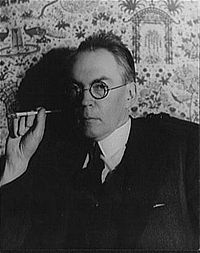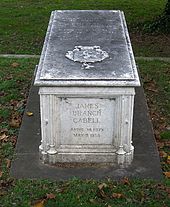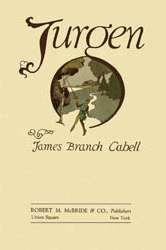James Branch Cabell
James Branch Cabell (born April 14, 1879 in Richmond (Virginia) , † May 5, 1958 ibid) was an American author of fantastic novels. The novel cycle Biography of the Life of Manuel (German as Die Chroniken von Poictesme ) occupies a central position in the fictional country of Poictesme, which is located in the south of France .
Life
Cabell's father was the doctor Robert Gamble Cabell (1847-1922), his mother was Anne Harris (1859-1915). His parents divorced in 1907. He was the great-grandson of William H. Cabell , the governor of Virginia between 1805 and 1808.
During his studies at William and Mary College (1893–1898) he gave lessons in French and Greek. He worked as a journalist for the New York Herald and briefly for the Richmond News. Cabell devoted himself to genealogical studies for ten years and was an accountant for the coal mines of his uncle James R. Branch in western Virginia.
In 1913 he married Rebecca Priscilla Bradley Shepherd (1874-1949), a widow with five children from his first marriage. They had a son together: Ballard Hartwell Cabell (1915–1980).
If he had written stories before, the wealth of his wife enabled him to devote himself entirely to writing. In the course of his life he wrote 52 books. In 1950, a year after the death of his first wife, he married Margaret Waller Freeman (1893? –1983), whom he had known for a long time.
Cabell died of a cerebral hemorrhage.
In 1937 he was elected to the American Academy of Arts and Letters .
The Chronicles of Poictesme
The 18 volumes of the Biography of the Life of Manuel ( Eng . The Chronicles of Poictesme ) occupy a central position in his oeuvre . The stories are grouped around the life and aftermath of the deceiver Manuel. Manuel begins his career as a swineherd and, through passive behavior that leaves room for interpretation, brings him to the master of Poictesme, a fictional province in medieval southern France. The series includes some premodern romances, poems, and genealogical considerations. However, the fantastic stories in the series attracted particular attention. They trace the lines from Manuel and Jürgen to the present day of the author, in which the fictional character Felix Kennaston, an author who resembles Cabell himself in many details, turns out to be the intellectual creator of his ancestor Manuel.
Cabell not only processes many details of his own biography in these stories, he also takes up the different views of life as a central theme. According to him, there are three basic attitudes: the followers of the chevaleresque attitude take the values of the environment seriously and strive to be successful according to them; the followers of the gallant attitude react negatively and ridiculously to these values, but do not put anything new in their place, and the followers of the poetic attitude disregard the values in order to create their own.
Cabell's stories are characterized by an elegant style and sometimes rough mockery, sometimes fine irony. Even if his works were highly valued by contemporaries, they hardly found any literary echo. In the Fantastik context, Fritz Leiber's stories about Fafhrd and the Gray Mouse are probably best known: The figure of the Gray Mouse is clearly inspired by Jürgen.
Jurgen
In 1919 the satirical-sarcastic parable Jurgen-A Comedy of Justice (Eng. Jürgen ) was published. It is about an aging pawnbroker in the fictional Poictesme, who praises the work of the demiurge and therefore gets a wish fulfilled.
But he is not satisfied with his wife's desired disappearance, and so he half-heartedly sets out to get her back. Jürgen sets off "in search of justice, over the grave of a dream and through the malice of time" ( in search of justice, over the grave of a dream and through the wickedness of time ), walks through different dream kingdoms, learns all kinds of beguiling women know and love, changes u. a. to duke, king, emperor and pope, however, does not find universal justice, but increasing disillusionment. On his long wanderings he loses faith, desire and imagination, even rejects them when they face him personified as women, and in the end returns to his wife and his job as a simple pawnbroker.
The New York Society for the Suppression of Vice had printing plates and prints confiscated in 1920 and brought a lawsuit against Jurgen for profanity, which, however, failed. Because of this process, Jurgen is his most famous work.
Jürgen in music
The American composer Deems Taylor created the symphonic poem Jurgen in 1925 , which was first recorded on phonograms by Mike Keith in 1999 . Visibly impressed, Taylor wrote in a letter to Mary Kennedy in 1920:
“I have finished Jurgen; a great and beautiful book, and the saddest book I ever read. I don't know why, exactly. The book hurts me - tears me to small pieces - but somehow it sets me free. It says the word that I've been trying to pronounce for so long. It tells me everything I am, and have been, and may be, unsparingly ... I don't know why I cry over it so much. It's too - something-or-other - to stand. I've been sitting here tonight, reading it aloud, with the tears streaming down my face ... "
( "I have read Jürgen through to the end; a great and beautiful book, and the saddest book I have ever read. I don't know exactly why. The book hurts me - tears me into small pieces - but somehow frees me. It says the word I've tried to say that for so long. It tells me everything I am, and was, and could be, completely ... I don't know why I cry so much about it. It's too - whatever - to endure it. Me sat here all night reading it out loud while tears streamed down my face ... " )
Quote James Branch Cabell
“The optimist proclaims that we live in the best of all possible worlds; and the pessimist fears this is true. "
( "The optimist claims that we live in the best of all possible worlds; and the pessimist fears that this is true." )
Works
In the lists below, the codes "B xxx " denote the number in the Brewer bibliography, the codes S xxx the volume number in the Storisende edition. Works that only make up part of a volume are marked with a "*".
- Biography of the Life of Manuel
-
Beyond Life (1919, S1, B1)
- German: Literature and life: Das Zehnt des Demiurgen. Storisende, 1997, ISBN 3-932261-01-1 .
-
Figures of Earth (1921, S2, B2)
- German The legend of Manuel: A comedy of appearances. Bastei Lübbe Fantasy # 20075, 1985, ISBN 3-404-20075-6 . New edition: Storisende, 1997, ISBN 3-932261-02-X .
-
The Silver Stallion (1926, S3, B3)
- German The Silver Stallion: A Comedy of Redemption. Bastei Lübbe Fantasy # 20081, 1986, ISBN 3-404-20081-0 .
-
The Witch-Woman (1948, B4)
-
The Music From Behind the Moon (1926, S4 *, B45)
- German The music from across the moon. In: The most beautiful of all women: Two comedies of love. Bastei Lübbe Fantasy # 20087, 1986, ISBN 3-404-20087-X .
-
The Way of Ecben (1929, S18 *, B48)
- English: There was once a king of Ecben… In: Lin Carter (ed.): The magic gardens. Pabel (Terra Fantasy # 45), 1978.
- The White Robe (1928, S18 *, B47)
-
The Music From Behind the Moon (1926, S4 *, B45)
-
The Soul of Melicent (1913, revised version 1920 as Domnei: A Comedy of Woman-Worship , S4 *, B5)
- German Domnei. In: The most beautiful of all women: Two comedies of love. Bastei Lübbe Fantasy # 20087, 1986, ISBN 3-404-20087-X .
- Chivalry (1909, revised 1921, S5, B6)
-
Jurgen, A Comedy of Justice (1919, S6, B7)
- German Jürgen: A comedy about justice. Translated by Karl Lerbs. Insel, 1928. New translation by Walter Brumm: Jürgen: A justice comedy. Heyne SF&F # 3801, 1981, ISBN 3-453-30703-8 .
- The Line of Love (1905, revised 1921, S7, B8)
-
The High Place (1923, S8, B9)
- German The Enchanted Place: A Comedy of Disenchantment. Translated by Heiko Langhans. Bastei Lübbe Fantasy # 20099, 1987, ISBN 3-404-20099-3 .
- Gallantry (1907, revised 1922, S9, B10)
-
Something About Eve (1927, S10, B11)
- German The magic of Eva: A comedy of fig leaves. Translated by Heiko Langhans. Bastei Lübbe Fantasy # 20105, 1988, ISBN 3-404-20105-1 .
- The Certain Hour (1916, S11, B12)
- The Cords of Vanity (1909, revised 1920, S12, B13)
- From the Hidden Way (Poems, 1916, revised 1924 and 1928 as Ballads from the Hidden Way , S13 *, B14)
- The Jewel Merchants (Drama, 1921, S13 *, B15)
- The Rivet in Grandfather's Neck (1915, S14, B16)
- The Eagle's Shadow (1904, revised 1923, S15, B17)
-
The Cream of the Jest (1917, revised 1922, S16 *, B18)
- German The broken seal: a comedy of excuses. Translated by Heiko Langhans. Bastei Lübbe Fantasy # 20111, 1988, ISBN 3-404-20111-6 .
- The Lineage of Lichfield , (fictional genealogy, 1922, S16 *, B19)
- Straws and Prayer-Books (Essays and Stories, 1924, S17, B20)
- Townsend of Lichfield (Essays, Stories, Poems, and Bibliography, 1930, S18, B21)
- Preface to the Past (1936, B22)
- Between Dawn and Sunrise (1930, B23)
Works related to Life of Manuel ;
- The Judging of Jurgen (satire on the Jurgen Trial, 1920, B42)
- Taboo (satire on the Jurgen trial in the form of a fantasy story, 1921, S18 *, B44)
- Sonnets from Antan (Poems, 1929, S18 *, B49)
- The Nightmare Has Triplets
- Smirt (1934, B24)
- Smith (1935, B25)
- Smire (1937, B26)
- The Heirs and Assigns
- Hamlet Had an Uncle (1940, B27)
- The King Was in His Counting House (1938, B28)
- The First Gentleman of America (1942, B29)
- It happened in Florida
- with AJ Hanna: The St. Johns (1943, B30)
- There Were Two Pirates (1946, B31)
- The Devil's Own Dear Son (1949, B32)
- Their Lives and Letters
- These Restless Heads (1932, B33)
- Special Delivery (1933, B34)
- Ladies and Gentlemen (1934, B35)
- Virginians are various
- Let Me Lie (1947, B36)
- Quiet Please (1952, B37)
- As I Remember It (1955, B38)
- Upon Genealogy
- Branchiana (1907, B39)
- Branch of Abingdon (1911, B40)
- The Majors and Their Marriages (1915, B41)
- Individual publications
- Joseph Hergesheimer (1921, B43)
- Ballades from the Hidden Way (1928, B46)
- Some of Us (1930, B50)
- The Nightmare Has Triplets (1937, B51)
- Of Ellen Glasgow (1938, B52)
- Work editions
- The works of James Branch Cabell. Storisende edition. 18 volumes. McBride 1927-1930.
- Essays
- M. Thomas Inge, Edgar E. MacDonald (Eds.): James Branch Cabell: Centennial Essays. Louisiana State University Press, Baton Rouge & London 1983, ISBN 0-8071-1028-0 .
- Letters
- Between Friends: Letters of James Branch Cabell. Harcourt, Brace and World, New York 1962.
literature
- Secondary literature
- Don D'Ammassa : James Branch Cabell: No Fit Employment for a Grown Man. In: Darrell Schweitzer: Discovering Classic Fantasy Fiction. Wildside Press, Gillete, NJ 1986, pp. 49-55.
- Joe Lee Davis: James Branch Cabell. Twayne Publishers, New York 1962.
- Carl van Doren: James Branch Cabell. RM McBride and Co., New York 1932.
- Edgar MacDonald: James Branch Cabell and Richmond-In-Virginia. University Press of Mississippi, Jackson 1993, ISBN 0-87805-622-X .
- James Riemer: From Satire to Subversion: The Fantasies of James Branch Cabell. Praeger, New York 1989.
- Michael Swanwick: What Can be Saved from the Wreckage? James Branch Cabell in the Twenty-First Century. Temporary Culture, Philadelphi & Montclair 2007.
- reference books
- Hans Joachim Alpers , Werner Fuchs , Ronald M. Hahn : Reclam's science fiction guide. Reclam, Stuttgart 1982, ISBN 3-15-010312-6 , p. 80.
- John Clute , David Langford : Cabell, James Branch. In: John Clute, Peter Nicholls : The Encyclopedia of Science Fiction . 3rd edition (online edition), version dated April 4, 2017.
- David Langford : Cabell, James Branch . In: John Clute , John Grant (eds.): The Encyclopedia of Fantasy . Orbit, London 1997, ISBN 1-85723-368-9 .
- Donald H. Tuck : The Encyclopedia of Science Fiction and Fantasy through 1968. Advent, Chicago 1974, ISBN 0-911682-20-1 , pp. 84 f.
- Bibliographies
- Frances Joan Brewer: James Branch Cabell: A Bibliography of his Writings, Biography and Criticism. 2 vols. University of Virginia Press, Charlottesville 1957.
- Matthew J. Bruccoli: James Branch Cabell: A Bibliography, Part II: Notes on the Cabell Collections at the University of Virginia. University of Virginia Press, Charlottesville 1957.
- IR Brussel: A Bibliography of the Writings of James Branch Cabell: A Revised Bibliography. The Centaur Bookshop, Philadelphia 1932.
- James N. Hall: James Branch Cabell: A Complete Bibliography (with a Supplement of Current Values of Cabell Books by Nelson Bond). Revisionist Press, New York 1974.
Web links
- The Silver Stallion: The James Branch Cabell Website (accessed December 2, 2017)
- Literature by and about James Branch Cabell in the catalog of the German National Library
- Works by James Branch Cabell in Project Gutenberg ( currently usually not available for users from Germany )
- James Branch Cabell in the Internet Speculative Fiction Database (English)
- James Branch Cabell in Encyclopedia of Virginia (accessed December 2, 2017)
- James Branch Cabell's Library at Virginia Commonwealth University , accessed December 2, 2017
- James Branch Cabell , page by Mike Keath (accessed December 2, 2017)
Individual evidence
- ^ Members: James Branch Cabell. American Academy of Arts and Letters, accessed February 20, 2019 .
- ↑ See A Bibliography of Books by James Branch Cabell
| personal data | |
|---|---|
| SURNAME | Cabell, James Branch |
| BRIEF DESCRIPTION | American fantasy writer |
| DATE OF BIRTH | April 14, 1879 |
| PLACE OF BIRTH | Richmond, Virginia , USA |
| DATE OF DEATH | May 5th 1958 |
| Place of death | Richmond, Virginia , USA |


